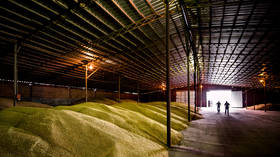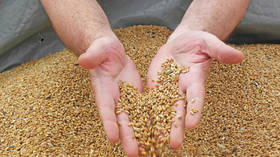EU issues projection on Ukraine’s grain exports

The EU is hoping for an increase in the volume of grain exports from Ukraine in June, European Commissioner for Transport Adina Valean said earlier this week at a meeting with EU farming ministers in Brussels.
“We hope that we will be able to reach 3-4 million [tons of grain exported] as early as next month, using all the means at our disposal. But we must not forget that Ukraine is transporting its agricultural products by land for the first time, and, unfortunately, the volumes that we can transport, are smaller and cannot compare with those that are moved by sea,” the official was cited as saying by the Italian newspaper Il Messaggero.
Prior to the conflict, Ukraine’s exports to the EU amounted to some 5 million tons per month, Valean stated. The volumes were shipped through the Black Sea ports, but now, due to the conflict, these ports have been blocked, and deliveries “must be redirected to railways, roads and inland waterways, then to the ports of the EU for further exports to world markets,” Valean explained.
According to Reuters, Ukraine’s grain exports dropped significantly following the launch of Russia’s military operation in late February, amounting to a mere 1 million tons in April and 1.5 million tons in May.
However, despite the current transportation difficulties, Valean pointed to the fact that “in less than 3 months 20-25 million tons of grain have to leave Ukraine” as another 50 million tons are expected to be harvested and local storages can only accommodate 50% of this amount.
“Freeing up storage capacity is the immediate priority in Ukraine but also in the EU,” the official noted.
Prices for wheat and other grains have surged to record highs over the past two months. Exacerbating this has been the fact that major producers Russia, Kazakhstan and India have curtailed exports to protect their domestic markets, while Ukraine’s supplies remain in limbo due to the ongoing conflict. Analysts anticipate global food insecurity due to the surging prices, while UN officials have been warning of outright famine in poorer countries.
Western nations have repeatedly put the blame for the grain shortages on Russia, accusing the country of being responsible for the blockade of the Black Sea ports. Moscow, however, has denied the accusations, saying that Ukrainian water mines were preventing ships loaded with grain from departing.
Russian Foreign Ministry spokeswoman Maria Zakharova said on Saturday that the previously blocked port in Mariupol had started operating after Russian forces gained control over it earlier this month and cleared the water way, thus allowing ships to leave. Also, Russia’s Defense Ministry announced on Friday that it had opened two humanitarian corridors for the passage of ships in the Black and Azov seas from the ports of Kherson, Nikolaev, Chornomorsk, Ochakov, Odessa and Yuzhny.
For more stories on economy & finance visit RT's business section














